Are you thinking about going off grid? One of the most significant decisions you’ll make is where to live. While the off-grid movement has become more mainstream, many places still aren’t friendly towards off grid living. So, we decided to make a list of the best states for off-grid living in America.
How Did We Decide Which States Are Best for Off Grid?
There are a lot of things you should consider when deciding where to live, but for off-grid living, these are the main parameters to consider:
Laws
You may be surprised that off-grid living isn’t completely legal in some states. For example, you might find it challenging to get a “certificate of occupancy” if your home doesn’t have electricity.
Likewise, some states have stricter permitting and building code requirements than others. This can make it difficult to legally use certain off-grid systems, such as graywater recycling or wind turbines.
For more info, read: Is Living Off Grid Legal? The Laws of Every State in America
Ability to Live Off the Land
For many people, living off grid and homesteading go hand-in-hand. This means you’ll need to live somewhere with natural resources like fertile soil and enough water for farming.
Even if you don’t want to live off the land, you will need natural resources like sunlight or wind to produce your own electricity.
For more info, read: Which States Are Best for Homesteading?
Natural Disasters
Some states are great for off-grid living but often get struck by severe disasters. This is one reason that Texas, Oklahoma, and Montana didn’t make the list of best off-grid states. Droughts in many states also make it harder to live off the land.
Cost
Unfortunately, going off grid usually isn’t cheap. In addition to the cost of land, you’ll also have expenses like building permits. Installing alternative systems legally – especially if the state has strict building codes – can also be pricier than using traditional grid-connected methods.
Long term, there are costs like property taxes, sales taxes, and cost of living to consider. Luckily, some states encourage self-sufficient living by giving tax breaks for homesteads.
Community and Culture
Some states have thriving off-grid communities. These communities can be a great resource and support you as you figure out your self-sufficient lifestyle.
Community and culture are important even if you want to live an isolated, off-grid lifestyle. For example, states with a culture of agriculture or strong Amish communities tend to be more accepting of the off-grid lifestyle. You won’t have as much interference from local government or neighbors.
Best States for Off Grid Living
1. Vermont
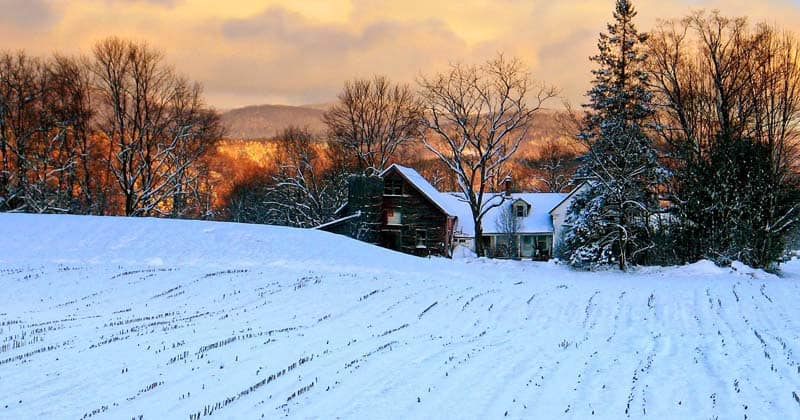
Laws
Vermont has stringent building laws, and you’ll need a permit for just about everything. However, this is a good thing. Here’s why:
In many other states, the laws don’t mention composting toilets or alternative building methods (think straw bale). This puts them in a legal gray area: you won’t know if the system is legal, and it is basically up to the whim of the local inspectors to approve or deny the system.
By contrast, Vermont’s laws are very clear. For example, Vermont is one of the only states that clearly outlines alternative waste disposal systems rules. You’ll still need a permit and maybe even a licensed engineer to design the system, but at least you know it will pass inspection.
For more info, read: Off-Grid Laws of Vermont
Living off the Land
Nearly 80% of the state is covered by forests, and the land is lush and arable. The state is well known for dairy, maple syrup, apples, and cheese – but many crops will also excel in the fertile land. There is ample water but only approximately 167 sunny days per year, so producing your own electricity from solar year round can be a challenge.
On the downside, Vermont winters come early and are harsh. The time between the last and first frost is only about 155 days, but the growing season can be extended by building a greenhouse.
Disasters
When it comes to natural disasters, Vermont is one of the safest states in the country. There are flooding and winter storms, but the state doesn’t have a significant risk of wildfires, drought, heat waves, hurricanes, or earthquakes.
For more info, read: Natural Disasters in Vermont
Cost
The cost of land in Vermont is not cheap. However, unlike in many states, most counties don’t have strict “minimum plot size” zoning rules. This means buying a small piece of land for your off-grid home is possible.
Costs are also high when it comes to taxes. Vermont has one of the country’s highest property tax rates and high sales taxes.
Community and Culture
Vermont is famous for its thriving homesteading culture, and there are numerous off-grid communities. Just note that a lot of this culture is because of how many hippies went to the state during the 1960s and 1970s in a “back to the land” movement. If you are liberal, you will feel at home here, but not so much if you are conservative.
2. Maine
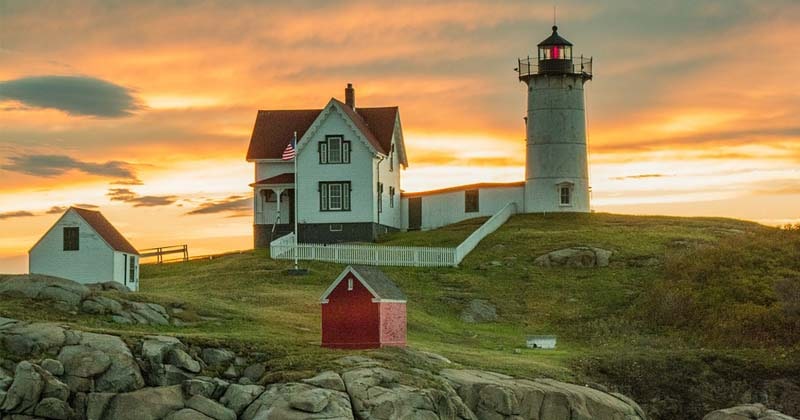
Laws
When it comes to laws, Maine is one of the best states for off-grid living. As a water-rich state, you are legally allowed to use the water on your property and do things like dig retention ponds.
Zoning laws are surprisingly friendly towards tiny homes and mobile home living. State laws even allow for alternative sewage systems, such as outhouses, in many cases.
Like with Vermont, you’ll need permits for almost everything in Maine. However, the laws are clear about what’s allowed, so there’s no legal gray area.
For more info, read: Off-Grid Laws of Maine
Living Off the Land
Maine is very similar to Vermont when it comes to living off the land. It also has a 155-day time between the last and first frost. However, Maine is a bit colder and snowier. The main agricultural items in Maine are dairy, potatoes, and chicken eggs. Because of the short growing season, greenhouse and aquaculture are also popular.
Disasters
Maine is one of the states that is least at risk when it comes to natural disasters. If you manage to find land outside of a flood zone and learn to prepare for the harsh winters, you can rest at ease.
For more info, read: Natural Disasters in Maine
Cost
Farmland is quite expensive in Maine. Expect to pay at least $5,350 per acre. Finding small plots of land in Maine can be difficult because of minimum plot size zoning rules.
The cost of living in Maine is lower than any other state in New England. However, the costs are still higher than most of the country. Property taxes and sales taxes are higher than the national average.
Community and Culture
Maine’s motto is “Live and Let Live.” This mentality is very favorable for off-grid living and you’ll find a supportive culture in the state. There are lots of farmer’s markets and a strong homesteading community.
3. Wisconsin
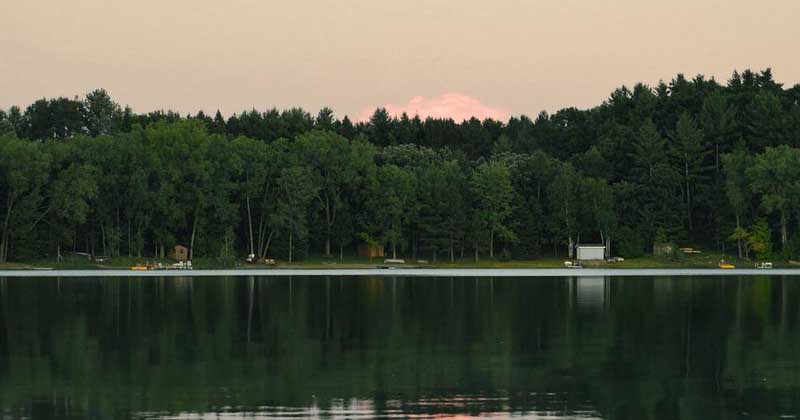
Laws
Wisconsin is mostly great when it comes to laws about off-grid living. There are still many places without zoning laws, so you can use your property how you wish in these areas. You must meet the state building codes, but there are exceptions for “primitive cabins” if you don’t live there fulltime.
The state even allows outhouses and is friendly to tiny homes. However, living in an RV is usually illegal.
As a water-rich state, Wisconsin has very relaxed laws about using water on or next to your property for domestic use. You don’t even need a permit to drill a well in many cases.
For more info, read: Off-Grid Laws of Wisconsin
Living Off the Land
Wisconsin’s soil is good for both crops and livestock. However, the growing season is very short, with just 110 days between the last and first frost. There is an average of 188 sunny days per year, so year-round solar power will be a challenge.
While Wisconsin does have a good supply of water, the state does have occasional problems with drought. Droughts are expected to worsen over the next decades.
Disasters
Compared to the rest of the country, Wisconsin is relatively safe from natural disasters. The biggest risk is winter storms and blizzards. Some parts of the state average 3 to 5 blizzards per season.
For more info, read: Natural Disasters in Wisconsin
Cost
The cost of land in Wisconsin is very high and is only getting more expensive. Expect to pay $5,700 per acre of farmland. Cropland is even more expensive. Property taxes in Wisconsin are the 8th most expensive in the country. On the plus side, cost of living in Wisconsin is lower than in most other states. The
Community and Culture
There are about 17,000 Amish living in Wisconsin and the state as a whole has a very favorable attitude towards living off the land and self-reliance. Many parts of the state are very rural though. So, if you were hoping to connect to other people living off grid or need assistance with some of your systems, you may struggle.
4. West Virginia
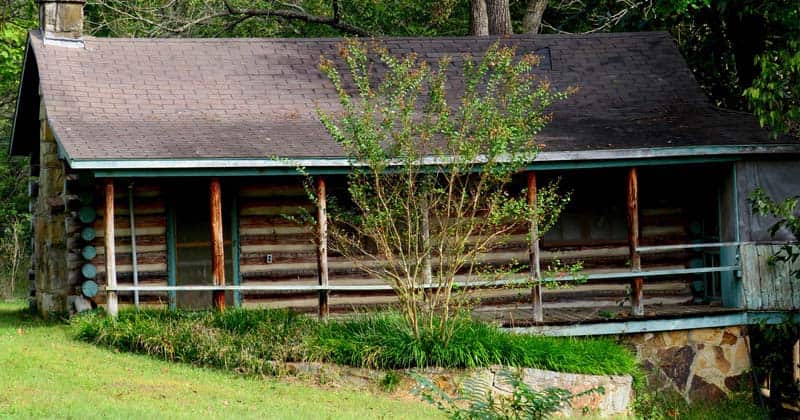
Laws
If you want to build your own off-grid home or live in an alternative structure, West Virginia is one of the best states to do it. That’s because, while West Virginia has a state building code, it does not require communities to adopt or enforce it. As a result, many unincorporated areas in West Virginia have no building codes.
About 40% of West Virginia is unincorporated, so there’s a good chance of finding land in an area without building codes.
Also read: States without Building Codes
Regardless of where you live, you must meet the state’s sewage laws. In most cases, you will be required to have septic, though outhouses are still legal in WV in certain situations.
As a water-rich state, West Virginia has very relaxed rules about water rights. In general, you’ll be able to use the water on your property without restrictions.
For more info, read: Off-Grid Laws of West Virginia
Living Off the Land
West Virginia is a very water-rich state and has lots of forest. However, the natural resources mostly stop there.
The state has shallow, acidic clay soil. There are only 150 days between the last and first frost, so West Virginia is not great for farming. It is better suited for livestock.
There are only about 160 sunny days per year in West Virginia, so providing your own solar power year-round can be a challenge. However, you may be able to utilize hydro power because of the state’s many waterways.
Disasters
When it comes to natural disasters, West Virginia is lower risk than the rest of the country. However, the state does regularly experience devastating floods, heavy snowfall, freezing rains, droughts and heat waves.
For more info, read: Natural Disasters in West Virginia
Cost
West Virginia has one of the lowest costs of living in the country. There are also low property taxes and state taxes are moderate. Farmland is still moderately expensive, though, with costs averaging $3,600 per acre.
Community and Culture
West Virginia has numerous thriving off-grid communities – and the state is becoming even more popular with people who want to live a self-reliant lifestyle. Overall, the state has a low violent crime rate, though there are problems associated with the state’s high poverty levels.
5. Minnesota
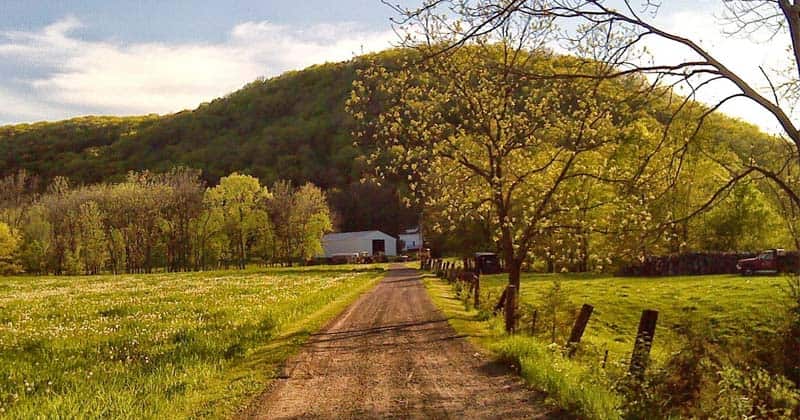
Going off grid in Minnesota could be difficult from the legal aspect. There are many rules and regulations, especially around waterways and tourist destinations, which might make it illegal to live the type of lifestyle you want.
One of the most frustrating obstacles is that the state highly regulates water use. You’ll need to apply for a permit to use water, even if it’s on your own property.
Surprisingly, composting toilets and outhouses are legal in Minnesota. Though there are regulations you need to follow about these too. In some places, you will be required to hook up to the local sewage system if it’s located nearby.
For more info, read: Off-Grid Laws of Minnesota
Living Off the Land
Minnesota really shines when it comes to living off the land. The state has ample water with a low risk of drought. Soil quality is also good throughout most of the state, so farming is strong. The state ranks #5 in the USA for agriculture, so you should be able to grow your own food.
Providing your own electricity could be a challenge, though, since the state has 195 sunny days per year (slightly below the average of 205 days).
Disasters
Compared to the rest of the country, Minnesota is at low risk for natural disasters. The state does regularly have harsh winters and freeze events, which you will need to be prepared for.
For more info, read: Natural Disasters in Minnesota
Cost
Farmland in Minnesota is very expensive at over $6,000 per acre. The cost of living is moderate, as are the state’s property and sales taxes. Don’t expect it to be cheap to go off-grid in Minnesota!
Community
Minnesota doesn’t have a strong off-grid community. However, they do have a very strong farming culture. Almost 3% of all land in the state is farmland. The residents are known for their courteous and reserved manners.
6. Kentucky
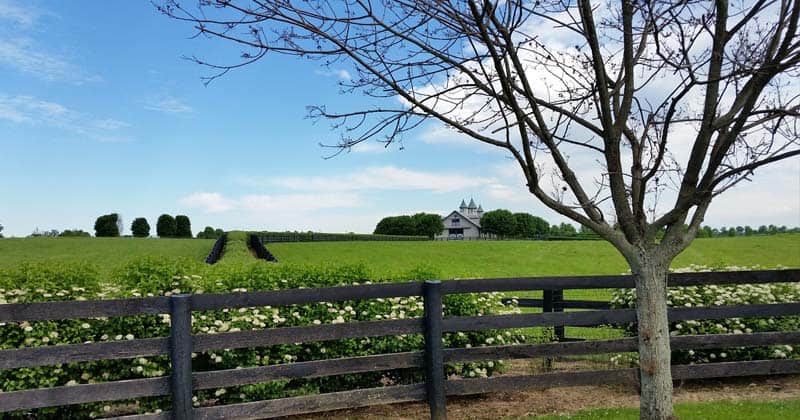
Laws
Kentucky is very relaxed when it comes to off-grid laws. Approximately half of the state is rural, and the zoning laws in these areas also tend to be very relaxed.
The state allows alternative sewage systems (though outhouses are illegal). Kentucky is one of the only states where you can legally recycle graywater without needing a septic system for it.
Despite having a high risk of drought, Kentucky still has relaxed laws regarding water rights and usage. You can generally use the water on your property without any restrictions or permit requirements.
For more info, read: Off-Grid Laws of Kentucky
Living Off the Land
Living off the land in Kentucky can be a challenge. In some parts of the state, the soil is deep and silty, so good for grains and pasture. The growing season is just 170 days. Kentucky regularly experiences drought conditions, which could also make it hard to grow your own food.
On the positive side, the climate in Kentucky is mild and temperatures rarely get below freezing.
Disasters
Compared to the rest of the country, Kentucky has a high risk of natural disasters. The poor drainage of the soil means there are regular floods. Kentucky also gets a lot of tornadoes and occasionally experiences earthquakes. Wildfires are another major concern in Kentucky. In the future, droughts will likely be a huge problem.
For more info, read: Natural Disasters in Kentucky
Cost
Going off-grid in Kentucky will probably be slightly cheaper than in other states. The price of farmland is moderately expensive at $4,300 per acre. However, the cost of living is moderate and the state has lower property taxes than average.
Community and Culture
Kentucky has a very large Amish community, and the state’s off-grid community seems to be growing. There is a long history of agriculture and you’ll like that the state has a very low violent crime rate.
7. Idaho
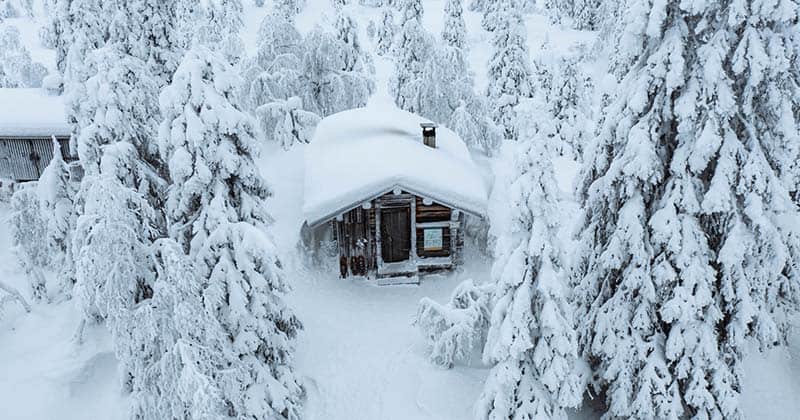
Laws
If you want to build a primitive off-grid home, Idaho has very favorable laws. Many rural places don’t require a Certificate of Occupancy, so you won’t have to worry about not passing inspections because your home doesn’t have running water or electricity.
There are also some exceptions to building codes for primitive cabins, but only if you don’t live there full-time.
Idaho is also quite relaxed in terms of wind power laws and rules about living in tiny homes. Compost toilets and outhouses are legal.
However, Idaho is ranked low on the list of best states for off grid living because of its strict water rights laws. It does NOT recognize riparian rights, so you can’t legally use the water on your property without getting a permit first.
For more info, read: Off-Grid Laws of Idaho
Living off the land
Homesteading in Idaho can be a challenge. While some areas have fertile soil, many have rocky, barren soil. There is also a short growing season and harsh winters to deal with. The state sometimes has severe droughts, which can impact your ability to produce your own food.
For more info, read: Homesteading in Idaho
Disasters
Idaho is one of the states with the fewest natural disasters. However, the risk of wildfires is very high throughout the state. Droughts and flooding are also serious risks.
For more info, read: Natural Disasters in Idaho
Cost
Compared to the rest of the country, Idaho has affordable farmland. But that doesn’t mean it will be easy to find cheap land! The average cost per acre of farmland in Idaho is $3,700. This is much higher than in nearby states.
Idaho does have low property taxes, a moderate cost of living and offers good homestead exemptions.
Community and Culture
Idaho isn’t known for off-grid living, but it does have a strong farming culture. Nearly 15% of the population of Idaho is farmers. There is also a very low crime rate.
8. Arkansas
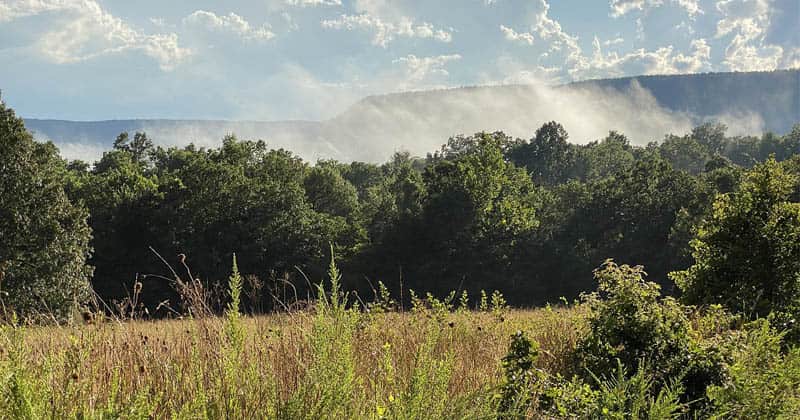
Laws
With some aspects of the law, Arkansas is very favorable towards off-grid living. For example, their laws actually mention off-grid sewage systems like compost toilets and graywater recycling are allowed. The water usage laws are relaxed.
Other aspects of the law are stricter, such as if you want to use rainwater indoors or install wind turbines.
For more info, read: Off-Grid Laws of Arkansas
Living Off the Land
Arkansas is arguably the best for living off the land of all the states listed here. It has very rich soil and plenty of natural resources like forests, rivers and lakes. The climate is moderate and the growing season is fairly long at 200 days.
This makes Arkansas a good choice for living off grid if you want to grow your own food, especially if you are a beginner.
For more info, read: Homesteading in Arkansas
Disasters
You might not want to live off-grid in Arkansas because the state regularly experiences natural disasters. These include serious tornadoes, hurricanes, flooding, droughts, heatwaves and wildfires. It’s one of the highest-risk places in the country to live for disasters!
For more info, read: Natural Disasters in Arkansas
Cost
Finding cheap off-grid land in Arkansas won’t be easy. The average price for farmland is $3,550. Finding small parcels of land can be difficult because most have already been bought up by large agricultural companies.
There are high state income taxes, high sales taxes and no state tax incentives for installing solar. However, the cost of living in Arkansas is still very low. If you search, it’s still possible to find cheap land.
Community and Culture
Arkansas is mostly a rural state. If you want solitude and isolation, then it is a great place for off-grid living. However, you’ll probably be disappointed if you want to be near a community. The state has a very high crime rate, rampant poverty, and many other social issues.
9. Oregon
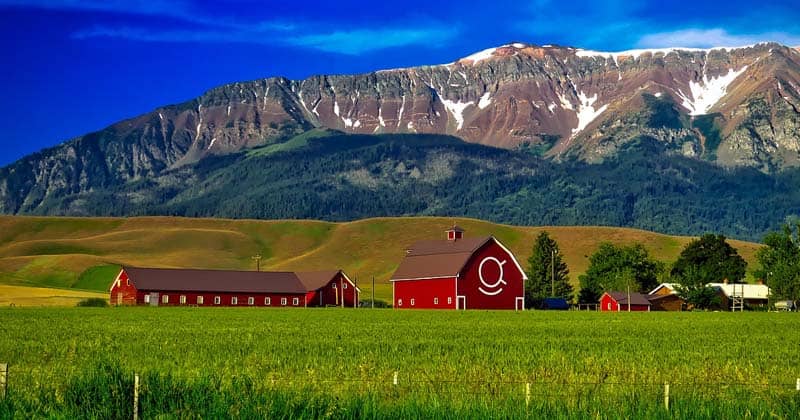
Laws
Oregon is like Vermont when it comes to the legalities of living off grid: you will need a permit for almost everything and there are strict regulations. However, because the laws actually address off-grid systems, there is no legal gray area about what is and isn’t allowed.
Oregon laws also actively encourage eco-friendly living (which often translates into off-grid living). For example, they encourage graywater recycling and have made tiny homes legal. Even outhouses and composting toilets are legal in Oregon.
For more info, read: Off-Grid Laws of Oregon
Living Off the Land
Oregon is famous for its beauty and abundance of natural resources. Living off the land can be easy in Oregon because of the long, cool growing season and rich soil.
However, Oregon does regularly experience droughts. This could make it difficult to grow your own food. There aren’t many sunny days per year either, so producing your own electricity can be a challenge.
Disasters
Oregon is incredibly high risk when it comes to wildfires. Because of climate change, the risk of wildfires is only increasing. While earthquakes don’t happen often in Oregon, the state is on the Cascadian Subduction Zone. If an earthquake occurred, it could be catastrophic.
For more info, read: Natural Disasters in Oregon
Cost
If you want to go off grid in Oregon, you will probably need to have a VERY large budget. The cost of farmland is actually relatively low ($3,000 per acre). However, much of Oregon is zoned as “Exclusive Farm Use”. To prevent over-development, there are laws that require you to purchase a minimum of 20 acres. It will be difficult or impossible to find small parcels of land in Oregon.
Oregon also has one of the highest costs of living in the USA. On the plus side, there are no state sales taxes and there are financial incentives for installing eco-friendly systems in your home.
Community and Culture
Oregon has a thriving homesteading culture and over 30,000 small farms in the state. You’ll find lots of local support for off-grid living, such as workshops, grant programs and farmer’s markets for selling homemade goods.
10. Wyoming
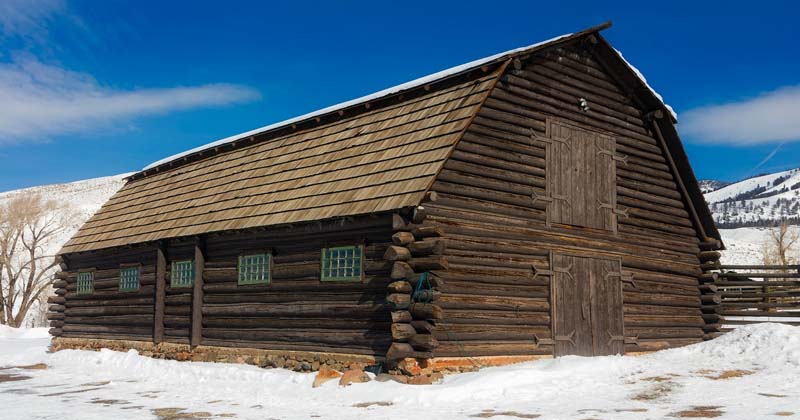
Laws
If you believe that you should be able to do whatever you want on your own property, Wyoming is one of the best states. While there are state building codes, Wyoming leaves it up to local jurisdictions to adopt them. As a result, many places in Wyoming are still without building codes. You are free to build your own home, even if it isn’t considered “safe.”
Much of Wyoming also doesn’t have zoning laws, which makes it easier to live in a tiny home or RV legally. Other laws about off-grid living are also relaxed in Wyoming.
However, the water usage laws are very strict. You do not automatically have the right to use water on your own property and getting a water permit can be very difficult.
For more info, read: Off-Grid Laws of Wyoming
Living off the land
If you want to live off the land in Wyoming, there is a very high learning curve. The soil is infertile, with poor drainage and water retention. Droughts are very common. The growing season is only 115 days. So, growing your own food is a major challenge.
Producing electricity is also difficult, especially if you are unable to install wind turbines.
Disasters
Compared to the rest of the USA, Wyoming is low risk for natural disasters. However, when natural disasters do occur in Wyoming, they can be massive. This includes devastating droughts and wildfires. Wyoming is also near Yellowstone super volcano, which would be catastrophic if it erupted.
For more info, read: Natural Disasters in Wyoming
Cost
If you are on a budget, Wyoming is one of the cheapest places to buy off-grid land in the USA. The average price of farmland is just $850 per acre. There is no state income tax, the state sales tax is low, and the cost of living is insanely low.
Community and Culture
Wyoming is known for its can-do and self-reliant attitude. This is great for off-grid living and you’ll find residents are sympathetic to your ideals. However, Wyoming is very remote. Don’t expect to have much in terms of community or support.
https://worldpopulationreview.com/state-rankings/property-taxes-by-state
https://worldpopulationreview.com/state-rankings/sales-tax-by-state
https://worldpopulationreview.com/state-rankings/cost-of-living-index-by-state
https://meric.mo.gov/data/cost-living-data-series
https://www.nass.usda.gov/Publications/Todays_Reports/reports/land0822.pdf
https://agriculture.vermont.gov/development/experience-vermont-agriculture
https://plantagreenhouses.com/blogs/planting-zones/vermont
https://digitalatlas.cose.isu.edu/geo/soils/soiltxt/soilmn.htm
https://www.kisu.org/podcast/sustainable-idaho/2021-09-21/sustainable-idaho-soil-health
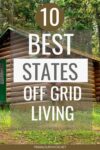


Wow! I Thought West Virginia Would Make The List.
Patrick, reading is fundamental.
I decided to homestead in eastern Kansas. Coffey county is flooded with energy, so the grid is reliable. Crops for personal use are easy to grow, 205 day growing season, cropland is about 6,000 per acre, and commercial farming and ranching are prevalent. laws are forgiving and taxes are modest.
No need to arm up as Amish, Mennonites, and other peace loving people populate the small villages. Population density is 14 people per square mile.
But you are never more than two weeks away from a flood or a drought in eastern Kansas. Kansas rerely makes any lists of desireable locations, which means it is desirable.
I recommend south dakota, especially central a d western part, I had the privilege to live on an Indian reservation and very few regulations and very isolated, if you’re into pheasant hunting and fishing you’ll love it, not for city slickers and California ______.